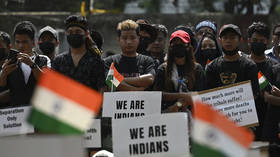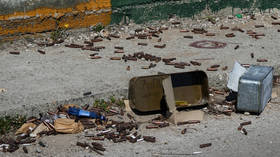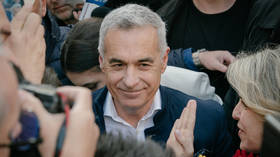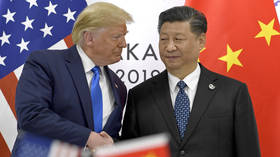UK weighs in on ‘religious freedom’ and poverty in India ahead of polls
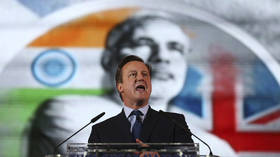
UK Foreign Secretary David Cameron has said his country should continue to press the issue of “religious freedom” in India as he weighed on the ethnic conflict in Manipur. He also commented on poverty in India, days ahead of parliamentary elections in the world’s largest democracy.
Answering a question in the UK Parliament on Thursday raised by Indarjit Singh of the House of Lords, Cameron stated there is a “clear religious part” to the ethnic clashes in Manipur in northeast India.
The former prime minister cited a report on Manipur produced last year by ex-BBC journalist David Campanale, which highlighted “a clear religious dimension” to the violence. Cameron stated that the UK had raised the issue of “religious tolerance” with the Indian government in the past, adding “that should continue to be the case.”
Manipur has been stricken by ethnic violence since May 2023. The dispute stems from animosity between the region’s valley-based Hindu Meitei majority, and the Christian Kuki tribes dwelling in the surrounding hills. More than 200 people have been killed in the hostilities, while tens of thousands more have been displaced.
VIDEO | Here’s what UK Secretary of State for Foreign, Commonwealth and Development Affairs, David Cameron (@David_Cameron), said while replying to a query in the House of Lords on BBC restructuring its India operations and UK-India trade deal.“The Indian Democracy is… pic.twitter.com/MmJoq7tBbM
— Press Trust of India (@PTI_News) April 18, 2024
The Narendra Modi-led Indian government, which was initially criticized by opposition parties and human rights organizations for not addressing the violence, has made it clear it considers the issue to be an “internal affair” for the country.
Last year, New Delhi rejected a UN report on Manipur, in which the Indian government was accused of an “inadequate humanitarian response” to the “grave” situation in the region. It also blasted the Strasbourg-based European Parliament after it adopted a resolution on Manipur.
“Such interference in India’s internal affairs is unacceptable, and reflects a colonial mindset,” a Foreign Ministry spokesperson said at the time, adding that “Indian authorities at all levels, including the judiciary, are seized of the situation in Manipur and are taking steps to maintain peace and harmony and law and order.”
During a recent visit to Manipur’s capital Imphal, Indian Home Minister Amit Shah said the central government’s priority is to establish peace, despite attempts that had been made to “break” it.
Last year, the United States Commission on International Religious Freedom (USCIRF) called on the Biden administration to designate India as a “country of particular concern” over “increased transnational targeting of religious minorities and those advocating on their behalf.” New Delhi has repeatedly denied these allegations.
Speaking in Parliament, Cameron also touched upon India’s “need” to deal with poverty. He suggested that to meet the UN’s sustainable development goals, “the most important thing India can do is to continue to grow and lift people out of poverty.” Without citing specific data, he further stated that there are “more people in India are below the poverty line than there are in Sub-Saharan Africa.”
According to the latest reports, around 420 million people were estimated to be living in absolute poverty in 2022 in Sub-Saharan Africa, which has a population of 1.2 billion people. That figure marked an increase from the one registered before the Covid-19 pandemic. In India, which has a population of 1.4 billion, government think tank NITI Aayog has reported a significant decline of nearly 18% in multidimensional poverty in the past decade – from 29.17% in 2013-14 to 11.28% in the 2022-23 financial year.
Where India Meets Russia – We are now on WhatsApp! Follow and share RT India in English and in Hindi
